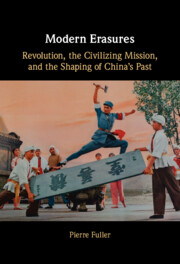
- Cited by 1
-
Cited byCrossref Citations
This Book has been cited by the following publications. This list is generated based on data provided by Crossref.
Vu, Linh D 2024. (Un)rest in revolution: Beijing’s Eight Treasures Mountain (Babaoshan) Revolutionary Cemetery and the making of China’s national memory. Memory Studies, Vol. 17, Issue. 1, p. 56.
- Publisher:
- Cambridge University Press
- Online publication date:
- March 2022
- Print publication year:
- 2022
- Online ISBN:
- 9781009026512


